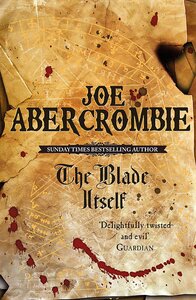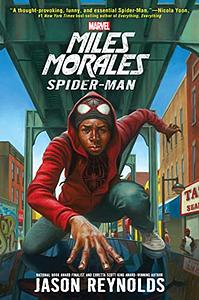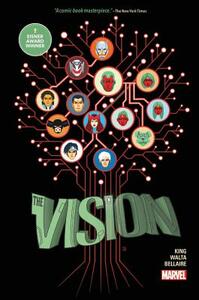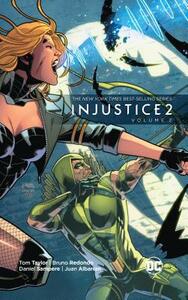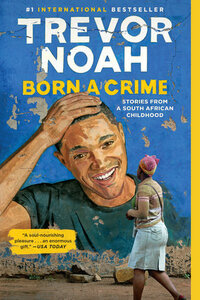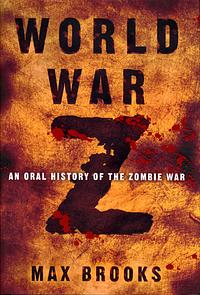You need to sign in or sign up before continuing.
Take a photo of a barcode or cover
nerdyreferencelibrarian89's Reviews (1.19k)
Another gem in the Civil War storyline, Front Line follows two reporters investigating the conflict, and Speed Ball, as he is put on trial.
The scenes with Speed Ball are chilling, in many ways he is oblivious, naive, but many of the points he sullenly makes are also not wrong. Even with this in mind he is beaten, mistreated, and jailed without any sort of sentencing. THis highlights the horror of a security state.
I have already reviewed the second volume of this, and honestly similar things apply. It is a great find for the series and well worth a read.
The scenes with Speed Ball are chilling, in many ways he is oblivious, naive, but many of the points he sullenly makes are also not wrong. Even with this in mind he is beaten, mistreated, and jailed without any sort of sentencing. THis highlights the horror of a security state.
I have already reviewed the second volume of this, and honestly similar things apply. It is a great find for the series and well worth a read.
This volume was all over the place. When I thought that I was finding something to interest me it would jump to something else seemingly odd and unrelated. The Heroes for Hire was better then the Thunderbolts, but neither was really an amazing read.
The only thing I really truly enjoyed was the character Humbug, who was weird and unique.
The only thing I really truly enjoyed was the character Humbug, who was weird and unique.
This was a reread of this book, this time I listened to it on audio.
Originally, I gave the book 4 stars, however, it easily deserves 5. I love this book, and it is even better knowing where the story is going as you can see the foundation for the next two books being subtly created.
The book itself is a must read for any fans of characters with well rounded personalities. The "good" characters still do a lot of bad things. Perhaps my favorite thing about this first book is watching the journey and thought process of Logan Ninefingers, the Bloody Nine, who is one of my all time favorite literature characters.
He fights to improve himself, make a positive impact on the world, all the while carrying the heavy baggage of his past misdeeds that are merely hinted at in this book. A thoughtful, well rounded Barbarian is a refreshing change in fantasy, and helps create on of the most entertaining character arcs I have read over the course of the trilogy.
Abercrombie does an amazing job making characters dis-likable, Luther is a whiny shit who you hope to fail, Biaz a annoying know it all, who never actually gives answers. Despite these characters being frankly terrible people, they feel human, and give a vitality and realism to the story and world.
I love the way Abercrombie writes the fights in this book, they aren't the heroic high fantasy that is traditionally written but instead the fights that are visceral and brutal. They are filled with broken bones, bruises, and cuts.
The audio for the book is frankly amazing. The narrator breathes even more life into this already vibrant story, lending a lisp to poor inquisitor Glotka, an arrogant tone to Luther. It is one of the best audio experiences I have had in a very long time, and I cannot wait to continue to listen to the series.
Honestly, if you are a fan of fantasy, do yourself a favor and read this book.
Originally, I gave the book 4 stars, however, it easily deserves 5. I love this book, and it is even better knowing where the story is going as you can see the foundation for the next two books being subtly created.
The book itself is a must read for any fans of characters with well rounded personalities. The "good" characters still do a lot of bad things. Perhaps my favorite thing about this first book is watching the journey and thought process of Logan Ninefingers, the Bloody Nine, who is one of my all time favorite literature characters.
He fights to improve himself, make a positive impact on the world, all the while carrying the heavy baggage of his past misdeeds that are merely hinted at in this book. A thoughtful, well rounded Barbarian is a refreshing change in fantasy, and helps create on of the most entertaining character arcs I have read over the course of the trilogy.
Abercrombie does an amazing job making characters dis-likable, Luther is a whiny shit who you hope to fail, Biaz a annoying know it all, who never actually gives answers. Despite these characters being frankly terrible people, they feel human, and give a vitality and realism to the story and world.
I love the way Abercrombie writes the fights in this book, they aren't the heroic high fantasy that is traditionally written but instead the fights that are visceral and brutal. They are filled with broken bones, bruises, and cuts.
The audio for the book is frankly amazing. The narrator breathes even more life into this already vibrant story, lending a lisp to poor inquisitor Glotka, an arrogant tone to Luther. It is one of the best audio experiences I have had in a very long time, and I cannot wait to continue to listen to the series.
Honestly, if you are a fan of fantasy, do yourself a favor and read this book.
This was the book that later began a now extremely popular anime of the same name.
I read this, specifically because I wanted to read a Japanese "Light" Novel, and thought this would be a good one to start with.
If you have seen Sword Art Online, this book adds very little to the story you already know. It follows the same exact story and progression as the anime, with much of the dialogue even the same.
The book does cut out many of the parts of the anime I despised, like the terribly annoying A.I. the Kirito and Asuna "adopt". It also gives very little information on the early part of the game, jumping right into the end game.
The writing style is quick, action packed, and filled with some interesting description. It was a fast and easy read, that was fun, but not particularly artful.
Much like the actual anime, Asuna and Kirito's relationship at times is VERY cheesy, but at least cute. The actions scenes are evocative and well described.
This would be a great way to be introduced to the series, as it cuts the garbage the anime adds. But if you have already scene the anime, unless you are looking the experience the anime in a different format it doesn't add much.
I read this, specifically because I wanted to read a Japanese "Light" Novel, and thought this would be a good one to start with.
If you have seen Sword Art Online, this book adds very little to the story you already know. It follows the same exact story and progression as the anime, with much of the dialogue even the same.
The book does cut out many of the parts of the anime I despised, like the terribly annoying A.I. the Kirito and Asuna "adopt". It also gives very little information on the early part of the game, jumping right into the end game.
The writing style is quick, action packed, and filled with some interesting description. It was a fast and easy read, that was fun, but not particularly artful.
Much like the actual anime, Asuna and Kirito's relationship at times is VERY cheesy, but at least cute. The actions scenes are evocative and well described.
This would be a great way to be introduced to the series, as it cuts the garbage the anime adds. But if you have already scene the anime, unless you are looking the experience the anime in a different format it doesn't add much.
This book was a disappointment. Reynolds writes a compelling narrative about growing up in Brooklyn, about going to a bougie prep school and feeling out of place, and about the subtle ways racism effects people; however, what he fails miserably at here is writing a story about Spiderman.
This is very much so a story about Mile Morales, with almost no Spiderman in it. Miles is actually "Spiderman" for probably less then 20 pages. This is partially because Miles is "retiring" as Spiderman for most of the story; however, even in the sections he finally is Spiderman, it is written well, it doesn't feel like Spiderman, it feels like how someone who isn't into Spiderman might write him.
This story feels disjointed, and reads like a different YA book written by Reynolds, that was then adapted to incorporate in Miles Morales a little.
The climax of the story was extremely disappointing. The big bad villain that Miles has been trying to figure out is basically a personification of racism. But he is introduced, and defeated within 30 ish pages, in such a quick fashion he feels like the most ridiculous caricature of villains. The encounter also ends in a way that feels very counter to Spiderman's morals. This again I think stems from the fact that as gifted of a writer as Jason Reynolds is, he doesn't seem to get Comics and their heros, he doesn't understand how central the villain is to these stories. In this story the villain seems thrown in last minute so that Miles can be Spiderman for at least one scene, but even that is bleh.
Honestly, this could have been great. But the problem is that Reynolds spends too much time focusing on Miles, his social life, his personal problems, and next to no time building up his alter ego, coming to grips with it. The Miles Morales storylines in comics are great because they manage to be super hero stories that also touch on social issues, reaching a wider audience. This story focuses heavily on social issues, while barely touching on super hero stuff, which doesn't work well.
Not a poorly written book, but just something that feels like it didn't work for Reynolds's style or interest.
This is very much so a story about Mile Morales, with almost no Spiderman in it. Miles is actually "Spiderman" for probably less then 20 pages. This is partially because Miles is "retiring" as Spiderman for most of the story; however, even in the sections he finally is Spiderman, it is written well, it doesn't feel like Spiderman, it feels like how someone who isn't into Spiderman might write him.
This story feels disjointed, and reads like a different YA book written by Reynolds, that was then adapted to incorporate in Miles Morales a little.
The climax of the story was extremely disappointing. The big bad villain that Miles has been trying to figure out is basically a personification of racism. But he is introduced, and defeated within 30 ish pages, in such a quick fashion he feels like the most ridiculous caricature of villains. The encounter also ends in a way that feels very counter to Spiderman's morals. This again I think stems from the fact that as gifted of a writer as Jason Reynolds is, he doesn't seem to get Comics and their heros, he doesn't understand how central the villain is to these stories. In this story the villain seems thrown in last minute so that Miles can be Spiderman for at least one scene, but even that is bleh.
Honestly, this could have been great. But the problem is that Reynolds spends too much time focusing on Miles, his social life, his personal problems, and next to no time building up his alter ego, coming to grips with it. The Miles Morales storylines in comics are great because they manage to be super hero stories that also touch on social issues, reaching a wider audience. This story focuses heavily on social issues, while barely touching on super hero stuff, which doesn't work well.
Not a poorly written book, but just something that feels like it didn't work for Reynolds's style or interest.
An amazing entry into comics, this explores a premise that isn't too unusual in Sci-Fy, androids wishing to be human, and it predictably goes wrong.
However, the use of characters many readers know and recognize, but written in a different light makes the story come alive. While this is a marvel story, it reads and is drawn like a science fiction master piece. Color is subtly used to promote certain moods and feelings.
Comic panes end up works of art, able to provoke emotional responses from the readers, without the use of any speech bubbles.
The story itself in many ways is a tragedy, but the journey of the Visions is also an exploration of humanity, and what it means to be human.
If you are hoping for a story filled with heroics, action, and humor, this is not the story for you. However, if you want a story that is filled with subtlety, emotion, discussions of right and wrong, of humanity, and the things that make us human, this is the story for you.
Despite depicting a bleak turn of events, the story has a combination of dark humor and creepiness that I loved.
Despite all these amazing things, I felt like it ended very abruptly, especially after some of the foreshadowing earlier in the story. It was still a good and satisfying ending, just a little abrupt.
However, the use of characters many readers know and recognize, but written in a different light makes the story come alive. While this is a marvel story, it reads and is drawn like a science fiction master piece. Color is subtly used to promote certain moods and feelings.
Comic panes end up works of art, able to provoke emotional responses from the readers, without the use of any speech bubbles.
The story itself in many ways is a tragedy, but the journey of the Visions is also an exploration of humanity, and what it means to be human.
If you are hoping for a story filled with heroics, action, and humor, this is not the story for you. However, if you want a story that is filled with subtlety, emotion, discussions of right and wrong, of humanity, and the things that make us human, this is the story for you.
Despite depicting a bleak turn of events, the story has a combination of dark humor and creepiness that I loved.
Despite all these amazing things, I felt like it ended very abruptly, especially after some of the foreshadowing earlier in the story. It was still a good and satisfying ending, just a little abrupt.
I know nothing about the other House of M books, and I have now idea why this had the Marvel Civil War tag, as it has nothing to do with that event.
This is basically a what if, what if all of Magneto's wishes came true. It uses him meeting Apocalypse early on as the rationale that he would have succeeded.
I enjoyed seeing Magneto leading his people to a sovereign nation. It was extremely satisfying to see many heroes (including Xavier) concluding that the enslavement, prosecution, murder, and harassment of mutants was too much.
The story zips along, very, very fast (Unsurprising for a what if scenario story), which really gives next to no time for true character development.
It also ends on a note of showing horrific acts of violence and enslavement of humans, at the hands of mutants. I found this pretty difficult to believe. Yes there would be some counter violence, but the argument that "without slow change within the system everything will just be flopped the other way, so mutants should stay enslaved and dying," is naive and does injustice to Magneto as a character.
This is basically a what if, what if all of Magneto's wishes came true. It uses him meeting Apocalypse early on as the rationale that he would have succeeded.
I enjoyed seeing Magneto leading his people to a sovereign nation. It was extremely satisfying to see many heroes (including Xavier) concluding that the enslavement, prosecution, murder, and harassment of mutants was too much.
The story zips along, very, very fast (Unsurprising for a what if scenario story), which really gives next to no time for true character development.
It also ends on a note of showing horrific acts of violence and enslavement of humans, at the hands of mutants. I found this pretty difficult to believe. Yes there would be some counter violence, but the argument that "without slow change within the system everything will just be flopped the other way, so mutants should stay enslaved and dying," is naive and does injustice to Magneto as a character.
After reading so much Marvel, it has been great to take a break with some D.C.
For the record I really enjoy the Injustice graphic novel series. The story is amazingly interesting, the character interaction and development intriguing, and the art work astounding.
This second part to injustice 2 continues to deliver on all the things we came to expect from the first series. Mindblowing action, great discussion of morality, the role of heroes and justice, and heroes doing terrible things, but in ways that make sense.
If you enjoy D.C. or Injustice this is a must read.
For the record I really enjoy the Injustice graphic novel series. The story is amazingly interesting, the character interaction and development intriguing, and the art work astounding.
This second part to injustice 2 continues to deliver on all the things we came to expect from the first series. Mindblowing action, great discussion of morality, the role of heroes and justice, and heroes doing terrible things, but in ways that make sense.
If you enjoy D.C. or Injustice this is a must read.
*Update* After reading reviews, 90% of the negative ones mention an incident where one of Noah's friends is named Hitler, which leads to a situation in a dance with he and his friends chanting this other friend's name as he danced.
Noah makes an excellent point about why this happens, discussing how to Africans, living under Apartheid and denied quality education, their concept of Hitler was vague at best. He is not one of the terrors of their history. Many reviewers found this story unacceptably offensive,but if they stepped back and really reflected I think that highlights the hypocritical nature of this complaint. How many of us (White Westerners) can name the creators of Apartheid, the presidents of South Africa that oversaw this modern day slavery? I know I can't.
Noah acknowledges Hitler was a horrendous human being, but he also highlights how there are many "Hitlers" to other parts of the world the West never discusses, so why wouldn't that work the other way as well. Do not let a poorly informed, ignorant perspective from a grouchy reviewer prevent you from reading or listening to this incredibly insightful and funny biography. *
This book was phenomenal, I listened to it and I highly recommend listening rather then reading. The book is narrated by Trevor Noah, and since Noah speaks all these different languages you get to hear these languages spoken, which was very cool. In addition, Noah is a great performer, and brings that brilliance to this book doing voices, short pauses for comedic effect, making the book a real pleasure to listen to.
The book itself covers Noah's childhood towards the end of Apartheid and the interesting experiences he had growing up in this environment. It is not a bleak joyless story, but one that tells the harsh realities of parts of South African culture, while also celebrating the good parts.
This book is not the story of how Noah got on television, and really only briefly mentions his career as a comedian, but this is because the other aspects of his life are so interesting. The energy and curiosity he brings to his observations makes the book riveting.
This is honestly one of the best biographies I have ever read, and I cannot recommend it enough. If you haven't read or listened to it, do it, it is well worth it!
Noah makes an excellent point about why this happens, discussing how to Africans, living under Apartheid and denied quality education, their concept of Hitler was vague at best. He is not one of the terrors of their history. Many reviewers found this story unacceptably offensive,but if they stepped back and really reflected I think that highlights the hypocritical nature of this complaint. How many of us (White Westerners) can name the creators of Apartheid, the presidents of South Africa that oversaw this modern day slavery? I know I can't.
Noah acknowledges Hitler was a horrendous human being, but he also highlights how there are many "Hitlers" to other parts of the world the West never discusses, so why wouldn't that work the other way as well. Do not let a poorly informed, ignorant perspective from a grouchy reviewer prevent you from reading or listening to this incredibly insightful and funny biography. *
This book was phenomenal, I listened to it and I highly recommend listening rather then reading. The book is narrated by Trevor Noah, and since Noah speaks all these different languages you get to hear these languages spoken, which was very cool. In addition, Noah is a great performer, and brings that brilliance to this book doing voices, short pauses for comedic effect, making the book a real pleasure to listen to.
The book itself covers Noah's childhood towards the end of Apartheid and the interesting experiences he had growing up in this environment. It is not a bleak joyless story, but one that tells the harsh realities of parts of South African culture, while also celebrating the good parts.
This book is not the story of how Noah got on television, and really only briefly mentions his career as a comedian, but this is because the other aspects of his life are so interesting. The energy and curiosity he brings to his observations makes the book riveting.
This is honestly one of the best biographies I have ever read, and I cannot recommend it enough. If you haven't read or listened to it, do it, it is well worth it!


